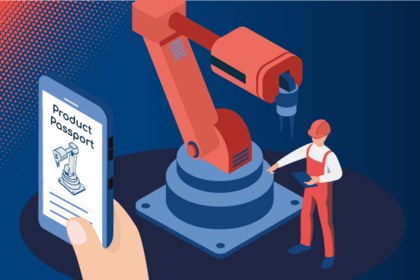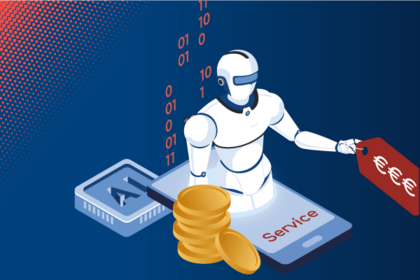Intelligent Instead of Just Digital: Smart Information in Aftersales & Service
Are your colleagues in other departments already benefiting from aftersales data? If not, it's time to act! This is your opportunity to become a knowledge ambassador. Here you can find out what your managers and employees in aftersales, service, and maintenance can do to make their information smart and keep your company competitive.

The status quo for information: Companies are facing a data dilemma
A recent German study has revealed a dilemma that is faced by many companies, including representatives of the mechanical and plant engineering sector: Over 40 percent of all their internal information is stuck in data silos.
It’s true that the data quality of many organizations has improved slightly in recent years. However, in 2023, 65% of the companies surveyed still complained that data silos restrict the use of information throughout the company.
Why data silos are critical for mechanical engineering
Data silos occur when information is stored in systems that are not networked with one another. There are many reasons for this, ranging from rigid departmental boundaries and strict security requirements to established structures from the pre-digital era.
For a long time, there was no urgent reason for machine manufacturers to break up data silos. Today, however, data silos stand in the way of digital transformation. If information remains unconnected and trapped in data silos, this has far-reaching consequences:
- It’s difficult to introduce data-based business models and new tools
- Lack of a data basis for strategic business decisions and process optimization
- No 360-degree view of customers
- Restrictions on productivity and efficiency
- Risks in the areas of IT security and data protection
The digitalization of information is progressing at the departmental level. Teams in marketing, sales, and design have understood the importance of digital information. However, company-wide added value that secures the competitiveness of the entire organization in the long term only arises when information is integrated across all departments.
From the data one-way street to the knowledge pipeline
It’s not enough to collect information at the departmental level and store it digitally. The next important step is to bundle it, network it bidirectionally, and use it strategically in all areas of the company.
This creates a knowledge pipeline that benefits all teams equally and forms the basis for data economy in the company — i.e. the use of data as a value-adding resource.
This will enable your company to become part of a larger digital ecosystem in the future — for example, as part of the Manufacturing-X initiative, in which machine manufacturers will be able to use and share data across the entire production and supply chain in the future. The prerequisite for this is smart information.
What makes information smart?
Companies already have large amounts of data at their disposal. However, big data doesn’t always mean smart data. Information only becomes smart when it is put into context. For example, if data records from marketing are compared with aftersales data records, synergies are created that help both teams to become more efficient and reduce their workload.
In order to create synergies, data records must be combined, duplicates must be eliminated, and correlations must be visualized. This is nothing new for many employees in aftersales & service. Technical editorial teams, for example, have long relied on consolidating information from departments such as development, design, and sales.
What can the aftersales & service department contribute to this transformation?
The teams responsible for aftersales and service, as well as the creators of spare parts catalogs, can become smart information pioneers. They can enable the employees responsible for technical writing, marketing and sales, training, support, logistics or product management to use the power of smart information holistically.
Aftersales teams generate great added value for themselves and others when they network across departments and promote the exchange of knowledge and information.
Important to-dos on the road to smart information
Information is often stuck in decentralized software solutions. The first step is therefore to bring it together in a central location so that every employee can work with it. Managers and employees in aftersales & service contribute to this process by
- contributing valuable information to the system, such as the experience of service technicians and valuable knowledge from the field.
- identifying and breaking down internal knowledge silos in order to promote the exchange of knowledge and thus counteract the shortage of skilled workers.
- breaking down company-wide data silos by integrating systems, tapping into source systems, and creating a single source of verified information.
Your team sits at the interface between various processes and departments and is therefore the ideal technical point of contact for everyone who requires information. You can do the following:
- Set up an online portal with service and spare parts knowledge and a shop function, then enrich it with information from technical documentation, circuit diagrams from the E-CAD system, 3D data from the CAD system, prices and availability from the ERP and other systems.
- Make information from service-relevant systems accessible company-wide and ensure a secure flow of information with appropriate metadata as well as role and rights concepts. This will enable the support team to resolve tickets faster, for example.
- Encourage sharing with other departments and put yourself in your colleagues' shoes. This will help you better understand what kind of information is required by different processes and procedures and what challenges other departments face.
You can make information mesh as smoothly as cogwheels. By linking data from your editorial system, your spare parts catalogs, and software systems such as Quanos SIS.one, your department will also become more productive.
The benefits of smart information for machine manufacturers
The data economy offers important opportunities for the German economy. The Federation of German Industries (BDI) forecasts that its value creation potential may be as high as 425 billion euros by 2025. If machine manufacturers also want to benefit from this potential, they need smart information.
For example, they need to enable new business models — especially in aftersales, which is taking on the role of a revenue driver in times of stagnating sales of new machines. With smart information, the path to Service 4.0 is no longer far away. Smart data
- creates new sources of revenue,
- ensures the competitiveness of your company, and
- strengthens your customer relationships.
When information is networked, valuable specialist knowledge flows seamlessly through all departments of a company. A great deal of data flows directly into the machines and systems or into interactive step-by-step instructions instead of being stuck in the heads of prospective retirees. This enables machine manufacturers to respond to the shortage of skilled workers and the digital transformation.
Smart information in practice
KAMPF, a supplier of slitting and winding machines, demonstrates how the networking of information works in practice. This customer has developed the IIoT service platform the@vanced. All of the data about the company’s machine performance is bundled centrally in this platform.
The company's specialist departments can find a wealth of information in the platform, including service information and important customer data in addition to data from machine operation. To this end, the@vanced combines information from PDM, ERP, and CRM and makes it available to the sales department, for example, for improved customer communication. That’s pretty smart!
Conclusion: Start the information revolution now!
When you leave data silos behind and work towards more data sharing, you can have a network of information that offers your team and other departments real added value.
Smart information that can be viewed by anyone at any time gives your company a decisive competitive edge. We’ll be happy to help you make your information more accessible. Contact us now — without any further obligations.




